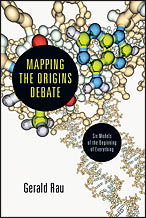Mapping the Origins Debate is the most useful resource I’ve found for getting a clear overview of the different possible explanations for the origins of life. Gerald Rau’s logical approach makes it easy to grasp each view (at least at a general level). His objective approach allows the reader to consider the various options with at least a superficial understanding of the key arguments supporting each position. At the same time Rau also presents the key challenges to the various positions and their points of evidence.
While there are more than six possible explanations for the origins of life, Rau reduces their number to six categories that encompass most of them: Naturalistic Evolution (NE), Nonteleological Evolution (NTE), Planned Evolution (PE), Directed Evolution (DE), Old-Earth Creation (OEC), and Young-Earth Creation (YEC). A chart in the second chapter and extensive charts at the back of the book help sort out the different models in a visual fashion.
Rau points out that each position is ultimately based on “different philosophical presuppositions that are outside the realm of science” (p. 176). The most important of these presuppositions, in Rau’s view, is the definition of science itself. For example, a definition of science that refuses to acknowledge the possibility of the existence of or interaction with a supernatural realm cuts off any inquiry or explanations that refer to the supernatural. It automatically excludes any evidence or inference that would point to an intelligent agent as a cause for the origin of life. Those who presuppose this definition of science approach questions about the origin of life looking exclusively for natural causes. Similar blind spots are caused by presuppositions of those holding other positions.
Given a priori presuppositions, people holding different views regarding origins look at the same evidence and come to different conclusions. Or they ignore evidence that doesn’t support their viewpoint, while touting evidence that does. Personally, I agree with Rau that none of the models has a complete model with adequate explanations for all of the evidence.
Those who are Christian theists (as well as some other theists) must also wrestle with how well their own beliefs about origins fit with their theology. Aside from the case of the YEC model which is dependent upon a literal interpretation of Genesis, Rau addresses these issues very briefly, more as an aside rather than as components of the models, probably since that would easily double the size of the book.
Rau has paid attention to the most current advances in science as well as the work of the Intelligent Design movement, both of which are upending some long held beliefs within the various models—e.g., genome mapping, discoveries of the complex molecular machinery within cells, challenges to evolution from the realm of mathematics, and irreducible complexity.
I suspect that someone who hasn’t read anything about origins would find Mapping the Origins Debate a bit overwhelming. But those who have been reading and thinking about the subject and are already familiar with some of the evidence and arguments should find it understandable. Some science background helps, but it's not essential to grasp the key points.
I have been reading seriously about origins for a few years, but I have found it difficult to pin down details of the various models. Mapping the Origins Debate brings it all together in one place. Rau doesn’t provide a conclusion about which model is most valid, although his own presuppositions inevitably leak through and lend more support to some models than to others. Nevertheless, this is a valuable resource for those who really want to understand the most current thinking and evidence for each of the models, and especially for theists who need to consider the realms of both religion and science and their possible interaction.











